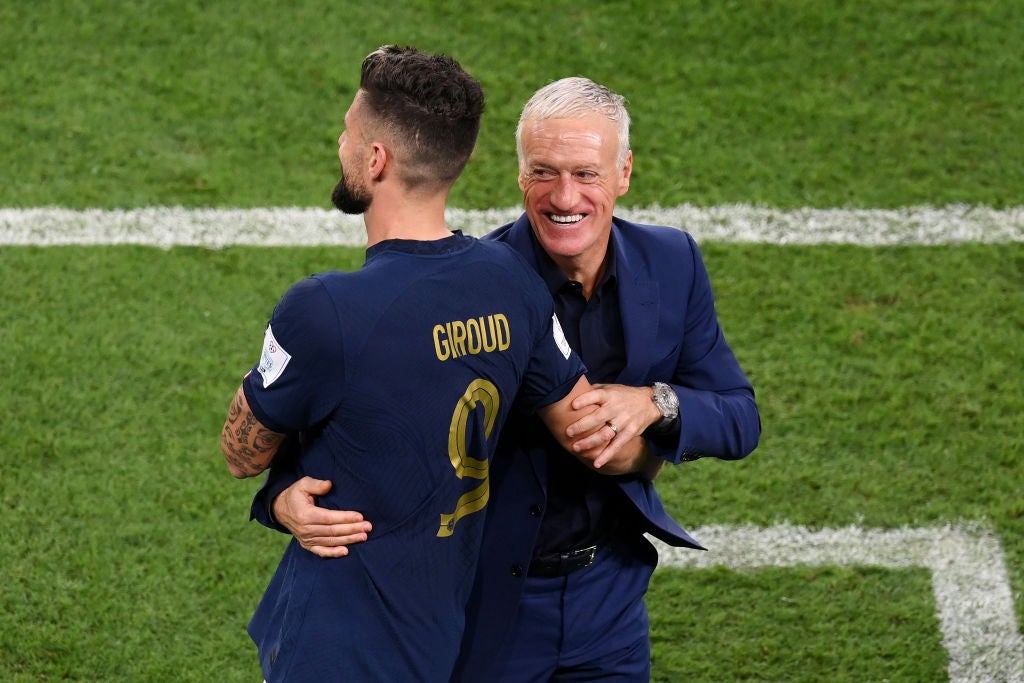
Didier Deschamps was discussing the secret of his success. “There is no secret,” he said, providing the kind of answer to explain why someone who, in a few days’ time, could rank as the joint most successful manager in the history of the World Cup is rarely seen as any kind of coaching genius.
An understated figure has assessed a formidable CV while remaining relatively unheralded. Only two men have managed World Cup-winning sides, captained World Cup-winning teams, European Championship-winning and Champions League-winning teams: Franz Beckenbauer and Deschamps. The Frenchman was one of the first to win the European Cup with two clubs as a player; as a coach, he has taken Monaco to the final, an achievement that has stood the test of time, and France to the Euro 2016 final. He has won the Nations League, which may or may not acquire more meaning in time. Now he could join Vittorio Pozzo, Italy’s coach in 1934 and 1938, as the only two-time World Cup-winning manager.
Is Deschamps an all-time great or a man who was in the right place at the right time? Both, perhaps. One of his closest allies, his captain for a decade, Hugo Lloris offered some insight. “He has of course tremendous experience as a player and a coach at international level,” the goalkeeper said. “He is calm and collected and transmits that to the players. He is an inspiration to the players. We have a great relationship between players and coach and it is not a coincidence he has been a coach for such a long time.”

None of which suggested Deschamps is one of management’s most original thinkers. There is no formation, no style of play, no evolution in the game that can be traced to him. Rather Deschamps has brought understanding and pragmatism, common sense and adaptability; the same qualities, arguably, that served him so well in midfields with more glamorous talents.
“You need a combination of things in place,” he explained. “You need world-class players; you never get this far without good players but that is not enough. You need other ingredients like a good team spirit and matches are decided on very small details so perhaps you need a bit of luck, you are walking a tightrope.”
Certainly his Les Bleus sides have benefited from players of the highest level: Zinedine Zidane and Thierry Henry in his playing days to Kylian Mbappe and Antoine Griezmann today. And yet it still takes some skill to configure them. When France prevailed in Russia in 2018, Griezmann was installed as the No. 10, Mbappe cutting in from the right flank. They won the Nations League with the Atletico Madrid man operating behind twin strikers, in the Paris Saint-Germain player and Karim Benzema. Now Mbappe is out on the left flank, Griezmann recast as a midfielder in a trio. “He has had a great tournament,” Deschamps said. “He is playing a different role this World Cup. He likes defending as much as attacking but it is not his No. 1 quality.”
If, like Olivier Giroud and Lloris, Griezmann feels an example of a player who has achieved more at international than club level, there was a resourcefulness to his reinvention. Deschamps’ feat in steering France to a second successive semi-final is greater because injuries have deprived them of N’Golo Kante, Paul Pogba, Christopher Nkunku, Lucas Hernandez, Presnel Kimpembe and Benzema.
If he is fortunate to have a Kante replacement of the calibre of Aurelien Tchouameni, Deschamps’ new formula has shown a capacity for forgiveness and an ability to recognise and reward improvement. Adrien Rabiot refused to be on the standby list for the squad four years ago; it could have ended his international career but the midfielder himself was surprised how willing Deschamps was to recall him. Now Rabiot has been rehabilitated and given a hybrid role, partly helping to compensate for Mbappe’s lack of attention to his defensive duties on the left.

Dayot Upamecano, who seemed a talent Deschamps did not rate, has now been installed alongside Raphael Varane at the heart of the defence. “He had an issue with his mental strength that prevented him from becoming the player he could but he has now managed to address that,” his manager said. After using a back three in the Nations League, Deschamps showed a clarity of thought in settling on a four-man defence before this tournament. Flexibility is part of his skillset and his teams have tended to be asymmetrical: in 2018, he had Blaise Matuidi tucked in on the left of midfield, whereas now he has an attack-minded left-back, in Theo Hernandez, and a defensive right-back, in Jules Kounde. It is not ideological, just a search for balance with the personnel available.
“I don’t like comparing teams,” Deschamps said. “Of course there is a similarity but some of our players have changed, some were there four years ago and if we have reached the semi-finals it is because we have done something right. We have shown great quality, shown great defensive quality and managed to score goals and when we have found difficulties we have managed to overcome them with a good team spirit.”
None of which sounds especially unique, but perhaps it is not supposed to. “We won the World Cup with our style but you can win it in other ways,” Deschamps offered, uncontroversially. But perhaps the recurring theme in Deschamps’ career is that he has found a way to win.







